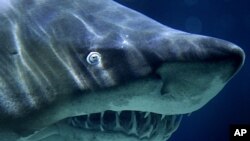Australian scientists investigating the cancer-fighting qualities of shark blood have been given a significant funding boost from an international pharmaceutical giant. The team from La Trobe University in Melbourne says trials indicate shark antibodies can be a potent weapon against malaria and breast cancer.
International pharmaceutical company Roche is funding Australian research into shark blood for six months. During that time scientists will try to determine if shark-blood antibodies are able to lock onto and neutralize cancer cells.
Shark antibodies are very small, which researchers say makes them particularly good at seeking out and binding to target cells. Thanks in part to funding from the Bill Gates Foundation, trials have already shown they can be an effective treatment against malaria.
The research started a decade ago and a team from Melbourne’s La Trobe University has created the world’s first 'test-tube library' of millions of antibodies from shark blood that could fight cancer and other diseases. Trials into breast cancer have also started, work that will be accelerated following the deal with Roche.
“There are several-thousand million different anti-bodies," explained associate professor Mick Foley, explaining the funding deal. "Really we have just got to find in our library one that will bind to their target and give that to them. We will license it to them," he explained. "But we are hoping that, you know, this is just a sort of vote of confidence, if you like, in big pharma (large pharmaceutical companies) that we have something interesting that might be very useful to the broader pharmaceutical industry."
Foley says his team’s work could provide a breakthrough. "We are researching into sort of, for example, cancers," Foley said. "So, we have several antibodies that we are looking at, one of which we know in vitro, again in the laboratory, if you put it into breast cancer cells it will stop those breast cancer cells from growing.”
Sharks have immune systems similar to humans, but their antibodies - the molecules that actually fight disease - are different to human anti-bodies and are extremely resilient.
The team in Melbourne found that shark antibodies can withstand high temperatures as well as extremely acidic or alkaline conditions.
News
Research on Cancer-Fighting Shark's Blood Gets Boost in Australia




